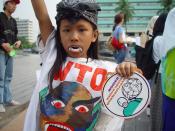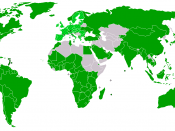Objective: Write a 200- to 300-word essay in APA format arguing for or against unrestricted international trade. Some possible platforms on which to write are comparative advantage, gains from trade, World Trade Organization, and trade restrictions. Support your position with three specific reasons.
International Trade Debate Part I
The debate over unrestricted international trade is likely to keep economists on their toes. Though there are several advantages and disadvantages to unrestricted international trade, in most cases the advantages do outweigh the disadvantages. Therefore, unrestricted international trade would appear to be more likely to be advantageous to all countries involved.
The principle of comparative advantage explains how international trade can be profitable for different countries to continue taking part in unrestricted international trade especially when one country has lower cost involved in producing a specific good. An absolute advantage would go to the country that can produce a good at lower cost.
Opportunity cost would benefit each country that is able to forgo production of one good to produce another good at lower cost. Comparative cost would benefit all countries able specialize in production of a good at lower cost in comparison to another country. When each country specializes in production of goods at lower cost, total production in the economy rises, and each country benefits from international trade through lower cost of goods (Mankiw, N., (2004).
It was concluded by Adam Smith that the principals of comparative advantage bring several gains to countries involved in unrestricted international trade (Mankiw, N., (2004). Hence, unrestricted international trade allows for the provision of superior products at lower production and consumer cost in all countries involved. In turn, lower production costs lead to increased competition between countries to improve production standards and increase production performance to maintain competitive prices. Accordingly, each country gains political...


